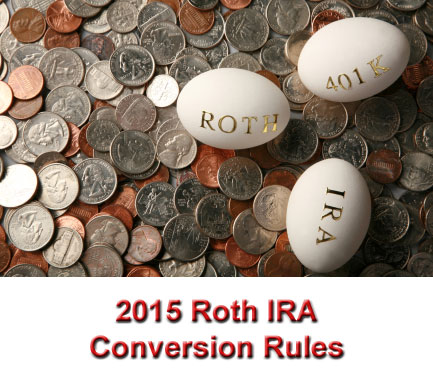 |
 |
|
|
2015 Roth IRA Conversion Rules
What are the 2015 Roth IRA conversion rules? You've probably heard a lot about the changes that took place in January 2010. But how do they impact you? In 2010, the biggest change came from the expiration of the $100,000 adjustable gross income (AGI) limit on Roth IRA conversions. In effect, this change enabled anyone (regardless of income) to...
Why is this such a big deal? Because under the old rules, high income earners were prohibited from doing either. But as you'll see, that all changed in 2010 and remains in effect for 2015.  2015 AGI Limit For Roth ConversionsUnder old IRS rules, you could only perform a Roth IRA conversion if your adjustable gross income (AGI) was $100,000 or less. For instance, let's say you had $80,000 in a Traditional IRA, and you earned $150,000 per year. Under the old rules, you were out of luck if you wanted to convert your Traditional IRA to a Roth IRA. But the 2015 Roth IRA conversion rules are different. How? The $100,000 conversion limit is gone. That's right... In January 2010, the $100,000 limit on Roth IRA conversions disappeared! That means anyone, regardless of income, can perform a Roth IRA conversion. For example, let's say you have a 401k you want to convert to a Roth IRA, but you earn $341,000 per year. Under the old rules, your income was too high to perform a conversion because it's higher than $100,000. But under the 2015 Roth IRA conversion rules, you're able to convert because the $100,000 limit is no longer in effect. Current Roth IRA Income LimitsThe 2015 Roth IRA conversion rules open the door for anyone to convert to a Roth IRA regardless of income, but... The door remains closed for high income earners when it comes to making new contributions. For example, the 2015 IRS limits for making a Roth IRA contribution are:
So even though 2015 provides high income earners with a great opportunity to convert, making new contributions to a Roth IRA remains out of the question. Or do they? Fortunately, the 2015 Roth IRA conversion rules open the door for anyone to make new contributions to a Roth IRA, regardless of income! How's that? Through use of a Traditional IRA and the conversion process... 2015 Roth IRA ContributionsIf you're ineligible to make a Roth IRA contribution because you earn too much, the 2015 Roth IRA conversion rules provide you with a golden opportunity. How? Here's how... While IRS income limits also restrict your ability to make Traditional IRA contributions, those limits only apply to deductible contributions, NOT non-deductible (after-tax) contributions. So if you're ineligible to make contributions to a Roth IRA, make non-deductible contributions to a Traditional IRA instead. Since the $100,000 income limit on making a Roth IRA conversion disappeared in January 2010, you're free to convert your Traditional IRA to a Roth IRA, and... Presto! While it wasn't a direct contribution to a Roth IRA, the end result is still the same. You just made a contribution to your Roth IRA. Do you see now why the 2015 Roth IRA conversion rules effectively eliminate the Roth IRA income limits? If you earned too much to open and contribute to a Roth IRA in the past, January 2010 marked a major change. Not only are you able to perform a Roth IRA conversion, but you're free to effectively contribute to a Roth IRA by making non-deductible Traditional IRA contributions and then converting to a Roth IRA. Need an example? Let's say you're 43 years old and single with a $311,000 annual income. Under IRS rules, you're prohibited from making a direct contribution to your Roth IRA. However, you CAN make up to $5,500 in non-deductible contributions to a Traditional IRA. And since the income restriction on Roth IRA conversions disappeared in January 2010, you can convert your Traditional IRA to a Roth IRA. Since you made your original contributions with after-tax dollars, those funds are NOT subject to income taxes as a result of the conversion process. So, ultimately, you end up with $5,500 in your Roth IRA as a result of making non-deductible Traditional IRA contributions and then converting to a Roth. And remember, as long as the 2015 Roth IRA conversion rules remain in effect, you can continue to do this on an annual basis. Unless Congress intervenes, the $100,000 limit on Roth IRA conversions expired indefinitely in the year 2010. So unless, or until, a new law is put on the books, you're free to enjoy the benefits of contributing to a Roth IRA, regardless of how much income you earn. ConclusionThe 2015 Roth IRA conversion rules mark the continuation of a significant change in the retirement planning landscape. Because of the expiration of the $100,000 income limit on Roth IRA conversions, high income earners are no longer stuck on the outside looking in. The full benefits and advantages of a Roth IRA are now available to everyone regardless of income. So if you've found yourself in the enviable position of earning too much to contribute to a Roth IRA, now is the time you've been waiting for. By making non-deductible Traditional IRA contributions and converting to a Roth IRA, you're able to effectively make Roth IRA contributions. So take advantage of the opportunity afforded by the 2015 Roth IRA conversion rules and get yourself a Roth IRA! In fact, you can use our Roth IRA conversion calculator right now to find out if a conversion is right for you.
Check out our new Facebook Page and follow us on Twitter!
Return to the top of 2015 Roth IRA Conversion Rules Return to 2015 Roth IRA Limits Return to the Your Roth IRA Website Homepage
|
What's New?Read 5 Reasons Why I Love My Roth IRA, our part in the Good Financial Cents Roth IRA Movement! Start planning ahead for next year by checking out 2017 Roth IRA contribution limits, and stay alert to this year's changes to the 2016 Roth IRA contribution limits. Our family fully funds our Roth IRA with this website. Learn how you can do it too. Are you confused or frustrated by the stock market? Learn how to build real wealth selecting individual stocks for your Roth IRA... Read more about what's new on the Roth IRA blog. Hi, I'm Britt, and this is my wife, Jen. Welcome to our Roth IRA information website! This is our humble attempt to turn a passion for personal finance into the Web's #1 resource for Roth IRA information. But, believe it or not, this site is more than just a hobby. It's a real business that provides a stable and steady stream of income for our family. In fact, because of this site, Jen is able to be a full-time stay-at-home mom and spend more time with our daughter, Samantha. But you want to know the best part? ...You can do the same thing! Anyone with a hobby or a passion (even with no previous experience building a website) can create a profitable site that generates extra income. If you're tired of solely depending on your job(s) for family income, click here now and learn why our income is increasing despite the financial crisis and how we're making our dreams come true. |
|
Search This SiteRoth IRA BasicsMore About Roth IRAsRoth IRA ResourcesAbout Your Roth IRALike Us On FacebookFollow Us On Twitter
RSSDisclaimerThe information contained in Your Roth IRA is for general information purposes only and does not constitute professional financial advice. Please contact an independent financial professional when seeking advice regarding your specific financial situation. For more information, please consult our full Disclaimer Policy as well as our Privacy Policy. Thank YouOur family started this site as a labor of love in February 2009, a few months after our daughter was born. Thank you for helping it become one of the most visited Roth IRA information sites. Thank you, too, to the "SBI!" software that made it all possible. We hope you find what you're looking for and wish you much continued success in your retirement planning! |
||
|
| ||






